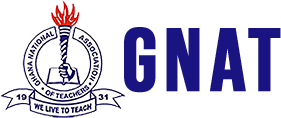A profession is a practice of occupation based on knowledge and skills acquired through a long
period of education and training, whose practitioners are more concerned with the services
they render to their clients and society.
Characteristics of a Profession
i. Professionals are guided by professional ethics;
ii. Have Associations or Organizations;
iii. The main concern of an Association or Organization is the interest of its clients, and not
necessarily monetary or financial rewards;
iv. It has the power of sanction;
v. It expects its members to perform their work with skill and care;
vi. Membership has autonomy of practice.
It is the belief of GNAT that teaching is a profession in Ghana and that all teachers will perform
their duties and behave as professionals. One of the purposes of the Education and
Professional Development Division is to promote professionalism in teaching in
Ghana. The GNAT has a Code of Ethics for its members. As part of the drive towards
professionalism in teaching, teachers must demonstrate that they have knowledge, skills and
attitudes to discharge their duties, and convince the education authorities that they need the
autonomy to practice their profession, without undue interference. The Division, through various
activities like training programmes, workshops, seminars, symposia, advocacy, among others,
directly or indirectly ensures that the members of GNAT satisfy the professional standards to
practise as teachers with ease.
The Ghana Education Service (GES) which is responsible for the management and
administration of pre-tertiary education in Ghana has a Code of Conduct which governs and
regulates the conduct of teachers, as well as a Collective Agreement which deals with their
terms and conditions of service.
The following summarize activities of the Education and Professional Development Division:
i. To educate its members on Education policies;
ii. Analyze national education policies and advise the Association accordingly
iii. Provide opportunities for continuous professional education and training of members;
iii. Collaborate with the National Inspectorate Board (NIB), National Teaching Council (NTC) and National Council for Curriculum and Assessment (NaCCA) to develop of relevant national curriculum to suit changing times;
iv. Represent the Association on examination bodies, such as WAEC, the Institute of Education, University of Cape Coast and College of Distance Education
v. Support book development projects, Writers’ clubs and Teaching and Learning Resources
vi. Supervise the publication of Teachers Journals
The Division organises its activities around the following units/departments:
Professional Development: It basically initiates training programmes geared towards the
general Continuous Professional Development of GNAT members across the Country.The
Organisation also organizes, with support from the Canadian Teachers Federation (CTF) and the Canadian
International Development Agency (CIDA) in-service workshops on annual basis in subject areas with
felt needs.The Consultative Council of Teachers Associations (CCTA) was
also formed to be responsible for the coordination of the activities of Subject Teachers Associations
in the pre-tertiary education sub-sector in Ghana.
Early Childhood: It does advocacy, provides professional support and develops union structures for
early childhood educators from private and public sectors of education affiliated to GNAT. Early
childhood programme centres were established in Ashanti, Central, Greater Accra, Upper East,
Upper West and Western Region.The Danish Union for Youth and Early Childhood Education
(BUPL) collaborated with GNAT on this programme.
Resource Centre: It is involved in the production of Teaching and Learning Resources for
teachers, the development of books, as well as other graphic design related materials.
Caulley Reference Library: It provides information services in support of the educational policies of
the Association, provides access to professional literature and offers assistance to persons seeking
information on issues pertinent to education for study and research. The clientele of the library are
teachers, GNAT staff, researchers and students.
